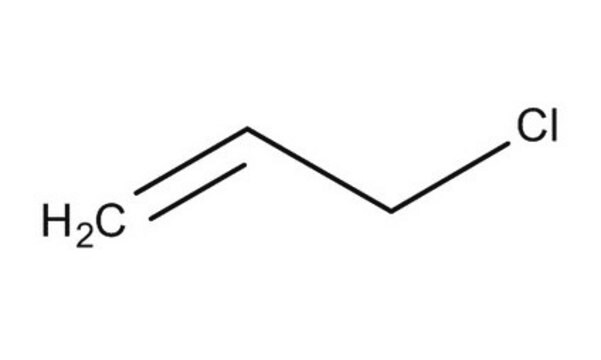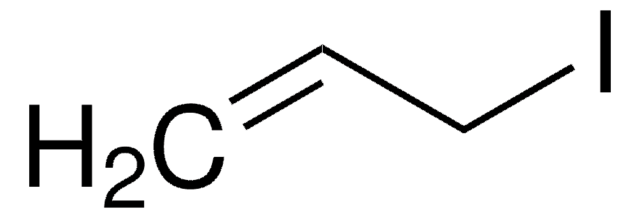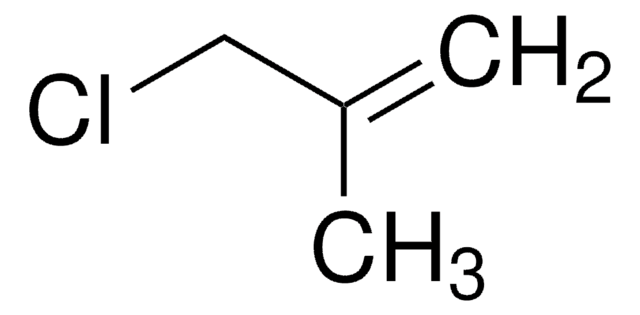236306
Allyl chloride
ReagentPlus®, 99%
Synonym(s):
3-Chloro-1-propene, Chlorallylene
About This Item
Recommended Products
vapor density
2.6 (vs air)
Quality Level
vapor pressure
20.58 psi ( 55 °C)
5.71 psi ( 20 °C)
product line
ReagentPlus®
Assay
99%
form
liquid
expl. lim.
11.2 %
refractive index
n20/D 1.414 (lit.)
bp
44-46 °C (lit.)
mp
−130 °C (lit.)
solubility
alcohol: miscible(lit.)
chloroform: miscible(lit.)
diethyl ether: miscible(lit.)
petroleum ether: miscible(lit.)
water: slightly soluble(lit.)
density
0.939 g/mL at 25 °C (lit.)
functional group
alkyl halide
chloro
storage temp.
2-8°C
SMILES string
ClCC=C
InChI
1S/C3H5Cl/c1-2-3-4/h2H,1,3H2
InChI key
OSDWBNJEKMUWAV-UHFFFAOYSA-N
Looking for similar products? Visit Product Comparison Guide
Related Categories
General description
Application
- as precursor for generation of allyl radicals by laser flash photolysis at 193nm
- in the synthesis of α,ω-difunctional chemical intermediates via the cross-metathesis reactions
Legal Information
Not finding the right product?
Try our Product Selector Tool.
Signal Word
Danger
Hazard Statements
Precautionary Statements
Hazard Classifications
Acute Tox. 4 Dermal - Acute Tox. 4 Inhalation - Acute Tox. 4 Oral - Aquatic Acute 1 - Carc. 2 - Eye Irrit. 2 - Flam. Liq. 2 - Muta. 2 - Skin Irrit. 2 - STOT RE 2 - STOT SE 3
Target Organs
Nervous system,Liver,Kidney, Respiratory system
Storage Class Code
3 - Flammable liquids
WGK
WGK 2
Flash Point(F)
-25.6 °F
Flash Point(C)
-32 °C
Personal Protective Equipment
Regulatory Listings
Regulatory Listings are mainly provided for chemical products. Only limited information can be provided here for non-chemical products. No entry means none of the components are listed. It is the user’s obligation to ensure the safe and legal use of the product.
PRTR
Class I Designated Chemical Substances
FSL
Group 4: Flammable liquids
Type 1 petroleums
Hazardous rank II
Water insoluble liquid
ISHL Indicated Name
Substances Subject to be Indicated Names
ISHL Notified Names
Substances Subject to be Notified Names
JAN Code
236306-VAR:
236306-BULK:
236306-100ML:4548173927671
236306-5ML:4548173927688
Choose from one of the most recent versions:
Already Own This Product?
Find documentation for the products that you have recently purchased in the Document Library.
Customers Also Viewed
Our team of scientists has experience in all areas of research including Life Science, Material Science, Chemical Synthesis, Chromatography, Analytical and many others.
Contact Technical Service














![Benzo[a]pyrene ≥96% (HPLC)](/deepweb/assets/sigmaaldrich/product/structures/253/820/be96d879-1811-46c0-8f11-612019691c2d/640/be96d879-1811-46c0-8f11-612019691c2d.png)

